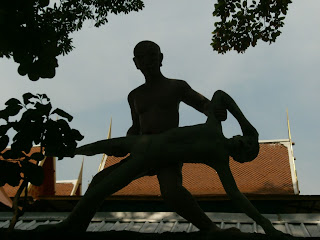I sat down to kill some time the other
day and started browsing through my video library. The only video I
hadn't already seen was the first season of Gossip Girl. Checking to
make sure I was alone, I turned on the first episode. I had no idea
what Gossip Girl was, other than a TV show about and for chicks. I
was fully expecting vapid plot lines peopled by shallow stereotypes
that would drive away in about 15 minutes. I wasn't disappointed.
In fact I watched the whole episode. I am almost ashamed to admit
that I found Gossip Girl gripping, albeit, probably not for reasons
you imagine.
Gossip Girl follows the lives of posh
upper crust adolescence living in Manhattan. At least, this is what
we are meant to believe. Actually, Gossip Girl takes place in a
dark, twisted perpetual weekend; a pseudo-reality peopled entirely by
stereotyped automatons where human interaction is governed entirely
by the laws of social inertia, making no allowances for unpredictable
behavior.
But this is what I expected. What
caught my attention was the fact that the characters in Gossip Girl
seem to be aware of their own limits. Bizarrely, the characters in
this world recognize their own inability to be unpredictable. Even
with their posh, glamorous distractions, they are unable to escape
subtle feeling, that maybe their entire lives have been planned out.
If the characters themselves are on the
cusp of realizing the predetermined quality of their life, then for
the audience is it grossly high-lighted. Introducing the Gossip
Girl, a semi-omniscient third person observer who draws our attention
to these stereotypes by offering vapid and often snide commentary.
We never meet this “Gossip Girl”, but we are led to believe that
she is right there with us safely observing the tangled mess of the
character's existence from the sidelines. This Gossip Girl offers a
humorous tint to an otherwise dark dreamworld. The interaction and
plot twist are predictable as it is, but the superfluous
foreshadowing made by the Gossip Girl pushes the whole scenario to
over the top ridiculous. It reminds me of the person who shouts at
the characters in a movies, “No! Don't go in there!” or, “You
dummy, can't you see she's using you?” If that person were
shallow, judgmental and entirely wrapped up in the lives of people
she doesn't know.
I would find the Gossip Girl a lot more
humorous if only she weren't so scary. Who is this person? She
claims to be a girl. Then again, she reminds her most captive
audience that she will never tell who she is. We assume that she is
an adolescent girl attending the same social functions and
frequenting the same scenes as the other rich socialites. But if
that is the case then why is she never observed by the people she is
observing? Why don't they interact with her? What are her methods?
How does she remain invisible? Perhaps she's not a girl at all.
Maybe the “Gossip Girl” in an undercover agent collecting
incriminating data to be used as blackmail and extortion. This would
make sense seeing as these social scenes are supposedly exclusive and
the Gossip Girl would need some trick up her sleeve to gain
admittance. (“Give me an invitation or I'll put these pictures on
my website.”)
Or even scarier. What if the “Gossip
Girl” isn't a girl at all, but multiple members posting photos
anonymously to a website designed to make social information freely
available...
All these details are glaringly obvious
within the first fifteen minutes of watching and I probably would
have lost interest if not for the existence of Dan. Gossip Girl may
follow the lives of the rich and glamorous, but it is actually the
story of Dan. Dan is a normal guy and his struggle to find a place
in a world where he is the only one capable of being unpredictable.
The dilemma set before Dan is embodied by the beautiful popular girl
whom he has been infatuated with since he can remember liking girls.
He desperately wants to be a part of this girl's life, but in order
to do so he must give up something of his freedom and become
something less that human.
Gossip Girl is a fascinating bit of
drama set in a bizarre, semi-realistic wonderland and populated by
characters flattened to the point of artistry. I even found a nugget
of wisdom. People cause their own problems. Whether living among
the posh elite or regular Joe Shmoes, people need problems. Not one
of the problems facing the characters of Gossip Girl actually
matters, yet the world seems to rise and set on the question of who
saw who do what with whom. It is a reminder to examine my own
preoccupations and wonder, “Does this truly make a difference? Am
I standing in the way of my own happiness?
The main failing of Gossip Girl is
that it was never suppose to be a TV show (or a book for that
matter). Gossip Girl was meant to be an incredibly dark Comidia del
Arte complete with audience participation. The characters are
stereotyped so the actors can change roles at the switch of the hat.
The shallow popular girl suddenly becomes the misunderstood outsider.
The lonely artist suddenly becomes the rich playboy. Audience
member shout advice because characters are incapable of making
decisions themselves.



























































